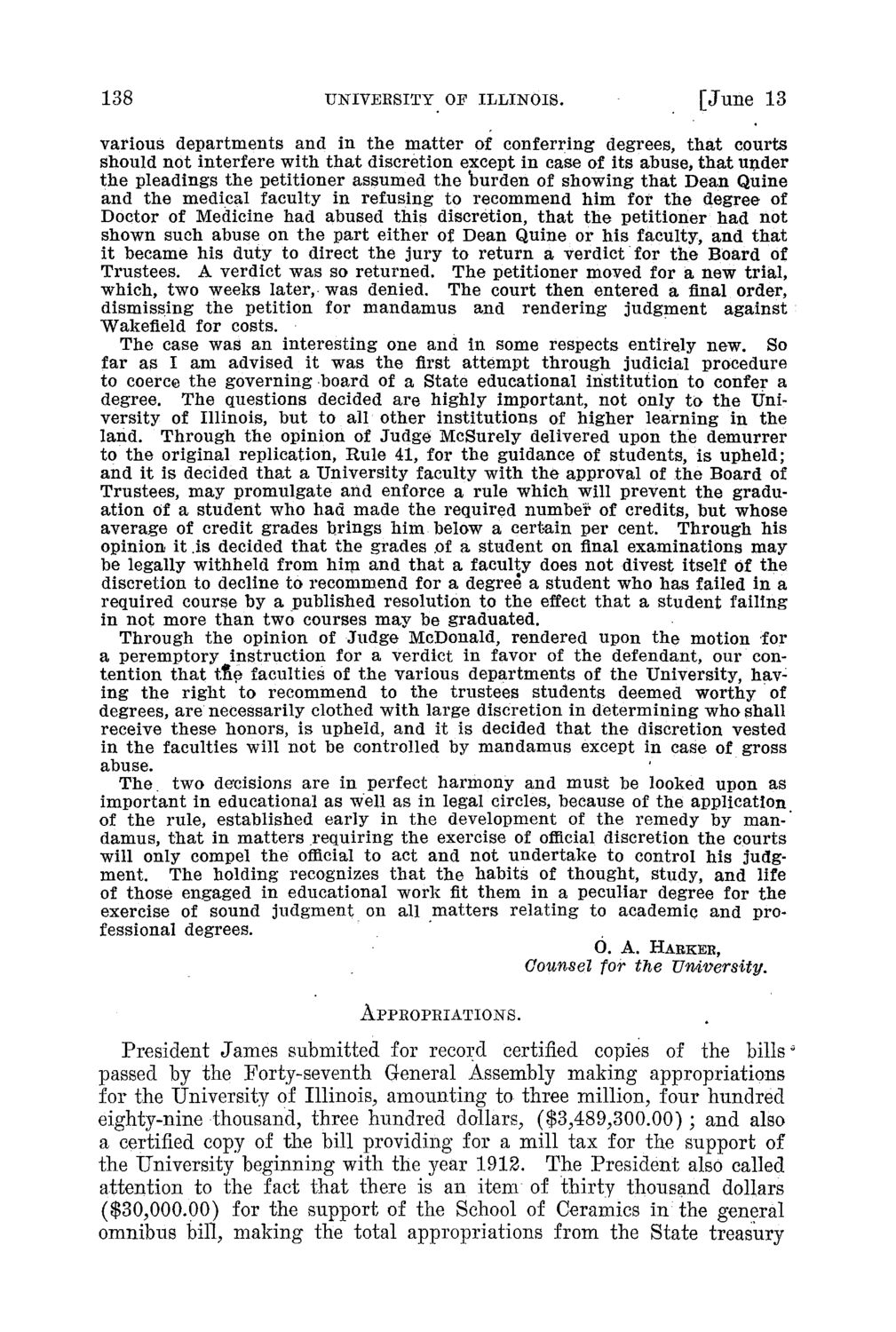| |
| |
Caption: Board of Trustees Minutes - 1912
This is a reduced-resolution page image for fast online browsing.

EXTRACTED TEXT FROM PAGE:
138 UNIVERSITY OF I L L I N O I S . [June 13 various departments and in the matter of conferring degrees, that courts should not interfere with that discretion except in case of its abuse, that under the pleadings the petitioner assumed the burden of showing that Dean Quine and the medical faculty in refusing to recommend him for the degree of Doctor of Medicine had abused this discretion, that the petitioner had not shown such abuse on the part either of Dean Quine or his faculty, and that it became his duty to direct the jury to return a verdict for the Board of Trustees. A verdict was so returned. The petitioner moved for a new trial, which, two weeks later, was denied. The court then entered a final order, dismissing the petition for mandamus and rendering judgment against "Wakefield for costs. The case was an interesting one and in some respects entirely new. So far as I am advised it was the first attempt through judicial procedure to coerce the governing board of a State educational institution to confer a degree. The questions decided are highly important, not only to the University of Illinois, but to all other institutions of higher learning in the land. Through the opinion of Judge McSurely delivered upon the demurrer to the original replication, Rule 41, for the guidance of students, is upheld; and it is decided that a University faculty with the approval of the Board of Trustees, may promulgate and enforce a rule which will prevent the graduation of a student who had made the required number of credits, but whose average of credit grades brings him below a certain per cent. Through his opinion it .is decided that the grades of a student on final examinations may be legally withheld from him and that a faculty does not divest itself of the discretion to decline to recommend for a degree a student who has failed in a required course by a published resolution to the effect that a student failing in not more than two courses may be graduated. Through the opinion of Judge McDonald, rendered upon the motion for a peremptory instruction for a verdict in favor of the defendant, our contention that tne faculties of the various departments of the University, having the right to recommend to the trustees students deemed worthy of degrees, are necessarily clothed with large discretion in determining who shall receive these honors, is upheld, and it is decided that the discretion vested in the faculties will not be controlled by mandamus except in case of gross abuse. ' The. two decisions are in perfect harmony and must be looked upon as important in educational as well as in legal circles, because of the application of the rule, established early in the development of the remedy by mandamus, that in matters requiring the exercise of official discretion the courts will only compel the official to act and not undertake to control his judgment. The holding recognizes that the habits of thought, study, and life of those engaged in educational work fit them in a peculiar degree for the exercise of sound judgment on all matters relating to academic and professional degrees. . ' O. A. HARKEK, Counsel for the APPROPRIATIONS. University. President James submitted for record certified copies of the bills" passed by the Forty-seventh General Assembly making appropriations for the "University of Illinois, amounting to three million, four hundred eighty-nine thousand, three hundred dollars, ($3,489,300.00) ; and also a certified copy of the bill providing for a mill tax for the support of the University beginning with the year 1912. The President also called attention to the fact t h a t there is an item of thirty thousand dollars ($30,000.00) for the support of the School of Ceramics in the general omnibus bill, making the total appropriations from the State treasury
| |